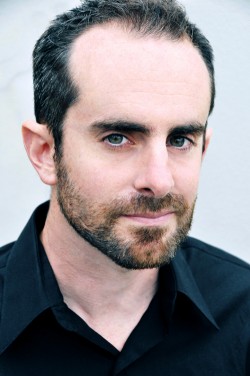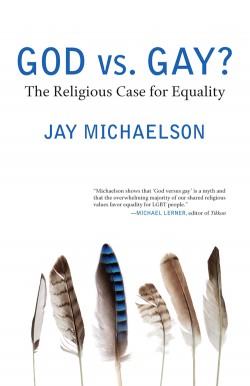Are religions, regardless of how they are practiced, actively hostile toward homosexuality? Or do the Old and New Testaments contain messages that transcend this common perception?
Faith, love and sexuality
Are religions, regardless of how they are practiced, actively hostile toward homosexuality? Or do the Old and New Testaments contain messages that transcend this common perception?

This evening, Portland State’s Queer Resource Center and Judaic Studies program will host a lecture by Jay Michaelson, author of God vs. Gay? The Religious Case for Equality (Beacon). Michaelson will discuss his personal journey as a gay Jew and why advocates for gay rights should include religious arguments.
But rather than rely on the conventional tit-for-tat strategy of using one Biblical verse to refute another, Michaelson appeals to the values of love and equality present in certain faith traditions. He believes that the dialogue in favor of gay rights should no longer seek to stereotype religions as anti-gay institutions.
Michaelson is the author of four books and 200 articles on the intersections of religion, spirituality, sexuality and law. God vs. Gay?, his latest book, has been nominated for a 2012 Lambda Literary Award. He is a contributing editor to the Forward newspaper, associate editor of Religion Dispatches magazine and the founding editor of Zeek magazine.

In addition, his work has appeared in Salon, Newsweek, Tikkun, The Huffington Post and other publications. His other books include Everything is God: The Radical Path of Nondual Judaism and Another Word for Sky: Poems.
The following interview has been edited for length and clarity.
Vanguard: What will your lecture at PSU focus on?
Jay Michaelson: It’s a part of my tour to support my book, which is called God vs. Gay? The Religious Case for Equality. It’s been on tour now for a few months, and I have been talking to a lot of college campuses as well as churches, synagogues and other places like that. I am trying to question the false dichotomy that many people perceive between sexuality and religion. I will be telling a bit about my story and trying to tell all of us, regardless of whether we are religious or whether we are gay or straight, to play a role in trying to have a better conversation than the one we often have about homosexuality and religion.
VG: Do you discuss specific Biblical passages or verses in your book, or is it about the overall message of such scriptures as the Bible?
JM: That is the message of the book. We can argue back and forth about two or three verses out of 31,000 in the Bible, and we don’t really get anywhere because the real question isn’t how to make sense of Leviticus but how do we interpret our religious scriptures in a way that is true to our values. I do talk about scriptural passages in the book…but I think it’s the least interesting part. It’s not hard to read it one way or the other: You can have a really conservative reading or a really liberal reading, and you don’t get anywhere.
The answer is that we don’t have to get stuck there. We have other clues about how to interpret those passages, and how—to put it more broadly—to be in a community together. Those are values, like: It’s not good to be alone; love is holy; we should pursue justice and equality; before judging another person, we should try to be in their shoes; love your neighbor as yourself, like you would want to be loved and not in a condescending way. That’s really what the book is about.
VG: What kind of reaction have you gotten from the more secular side of the LGBT community?
JM: Some of the questions I often get are, “Why should we care about religion?” and so on. Let’s just get away from them completely. Let the Titanic sink, and get these people off our back. I am very receptive to that view, but I think it’s actually a privileged view to take. Activists often ask: “Who are we? Who is the community that we are a part of?” To me the “we” includes people and kids who aren’t so privileged and can’t just say, “I’m over religion.” They might be in very conservative homes, or living in places where public values are dictated by religion. All I really have to say is two words: Rick Santorum. It’s just to demonstrate that religion, unfortunately for some, is playing a central role in how our secular culture conceives this issue. If we ignore that part of our culture, we are really betraying the most vulnerable members of our community.
VG: The liberal-secular group has been known as some of the biggest supporters of gay and lesbian rights. But it’s not the Constitution vs. the Bible; it’s more about bringing religion into the conversation instead of trying to exclude it, right?
JM: I went to law school, was trained as a lawyer and I worked in public policy for a little bit, so I do get the constitutional argument, but there is something deeper here. Those who are on the pro-equality team should try to understand that folks on the other side are not all heathens, homophobes and stupid people. Some are like that, but a lot of people are sincerely troubled by what they perceive to be a conflict in their internal religious values or philosophical values. On the one hand, they want to feel compassionate towards their family members or community members. But on the other hand, they have a sincere religious belief, and it is possible to engage with that. We don’t have to just leave it on the table or tell people you have to choose one or the other.
I was active here in New York in the marriage equality battle that we won in June last year, and it was God vs. gay every night in the media. You would see an opponent of marriage equality wearing a clerical collar or in some way indicating that they were religious. And for the marriage equality side it would be someone not religious who would not be talking about the values and would only be talking about liberty and equality. That is an important conversation, but it’s only one of the many that need to have.
VG: It seems that being anti-religion is hypocritical in an equality debate as religion is also a civil right. What are your views on this argument?
JM: The right wing is onto this. What we see is a new wave of anti-gay activism, and it’s couching itself in the language of religious freedom: “I’m entitled to have the freedom to discriminate.” That argument is really cynical, but it stems from the failure to have the values conversation that we need to have. It’s really striking what’s happening now. The bullies have their lobby in state legislatures to try to hurt and restrict anti-bulling laws. They are calling out religious exemptions. You can beat up a kid on the playground if you say God made you do it. Who would Jesus bully? That doesn’t seem to be the message of the gospel.
It points to the fact that this is not just a public legal debate; it is a values debate. We are missing the heart of the matter if we refuse to engage. There are a lot of religious queer people that are happy in their religious community. They aren’t the majority in the LGBT community, but there are a lot of us.
VG: How old were you when you came out?
JM: I was old! I came out to myself in my 20s and out to everyone else when I was close to 30. I lived “God vs. gay.” I really thought that coming out would be the end of my religious life, but after I did I found it was the most religious thing I’d ever done. I wish when I was in college I was “out and loud and proud.” But on the other hand, that experience reminds me about what the stakes really are. I was never physically in danger, so I had it relatively easy. But I did experience what it’s like “in the closet.” I have a firsthand experience about how antithetical it is to anything I would call spirituality.
VG: It seems that people tend to pick and choose words and passages and use them for any particular agenda they want. What are your thoughts on how religion is used as a weapon?
JM: That’s in the traditions itself. There’s the adage that the Devil can quote the Bible for his own purpose. If we’re not guided by real values, being a community and really understanding other people, it’s just a game. You can twist the Bible and any other book for that matter to do whatever you want. There is directionality to how consciousness evolves with these kinds of questions. It’s really hard to maintain that when you open your eyes and your ears to the people in your community. That’s why I feel optimistic about this struggle. It can get kind of nasty sometimes, but I know I’m going to win. When you see, even in traditional religious communities, the sense of crisis they have around this issue you know you’re going to win.
A lecture with Jay Michaelson
Tonight
4–5:30 p.m.
Native American Student and Community Center
Free and open to the public





